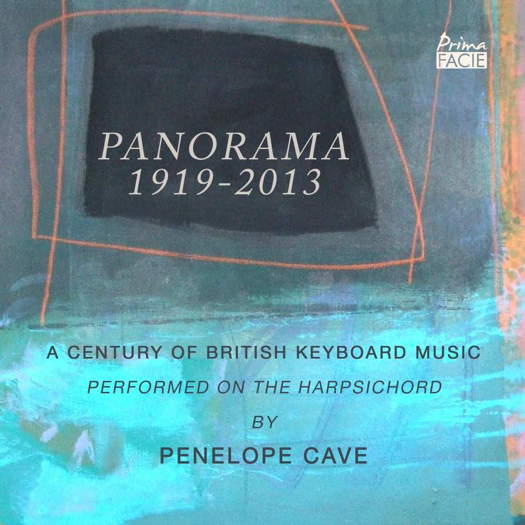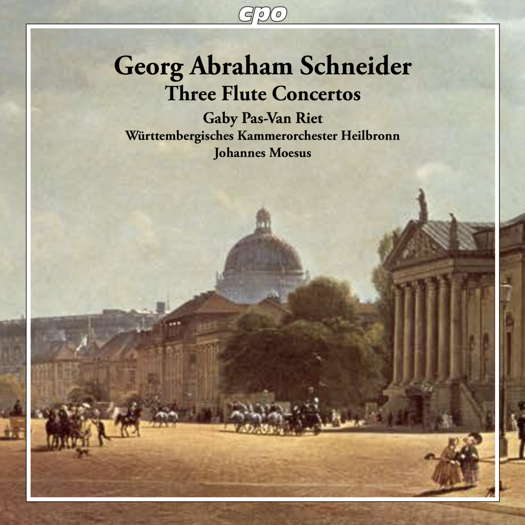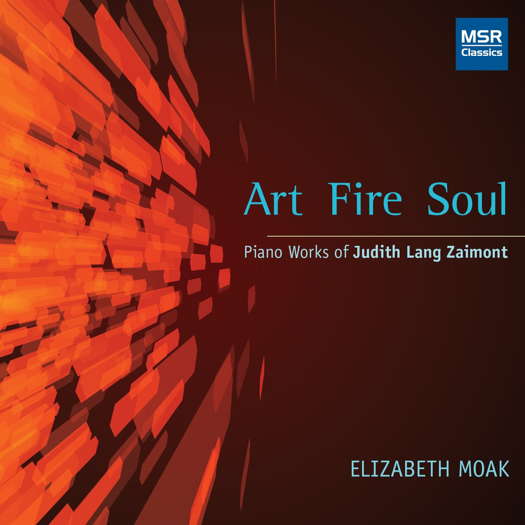 SPONSORED: CD Spotlight. A Fantastic Collection. Penelope Cave Panorama CD. Little-known harpsichord gems, strongly recommended by Alice McVeigh.
SPONSORED: CD Spotlight. A Fantastic Collection. Penelope Cave Panorama CD. Little-known harpsichord gems, strongly recommended by Alice McVeigh.
All sponsored features >>

Breathtaking Dexterity
GERALD FENECH listens to Schneider flute concertos
'Gaby Pas-Van Riet despatches these irresistibly beautiful pieces with infectious warmth and grace ...'
Georg Abraham Schneider was born in Darmstadt on 12 April 1770, the same year as Beethoven. His musical gifts manifested themselves at an early age, and very soon he learned to play all the instruments except the piano. At seventeen he became a member of the Darmstadt Court Orchestra, and when Prince Henry of Prussia hired him as a hornist for the Rheinsberg Ensemble, Schneider moved there in 1795. To his disappointment work was limited, so the composer proceeded to study composition. It was in Rheinsberg that Schneider wrote many of his instrumental works which were subsequently published.
In 1802 he moved to Berlin following the Prince's death, and it was in the capital that his reputation as a fine teacher was cemented, something that provided the composer and his family with regular sources of income. However, cataclysmic historical events soon brought Schneider's career to an abrupt end. In 1806, the French occupied Berlin, and life in the city came to a standstill. Schneider lost everything, even his home, and the situation was indeed desperate. It was only when he embarked on a concert tour that things started to turn for the better.
By 1809 the King was able to return to Berlin, and musical life started to return to some kind of normality, the composer's included. By the time of his demise on 19 January 1839, Schneider was a highly respected composer and the recipient of several important appointments in key posts. He also had the great satisfaction that before his death he saw all of his family members become excellent composers themselves.
Schneider the composer is a representative of the spirit of Haydn and Mozart, and wanted to be understood as a preserver of their legacy. In reviews it was certified that he was knowledgeable in matters of compositional technique and a solid practitioner of the musical craft that favoured the tastes of the middle class. Despite composing a huge number of works in practically all the genres, a reliable review of his oeuvre has not yet been compiled. The fact that various works by Schneider were printed under the same opus number by different publishers also makes it difficult to come to a definite overview.
His instrumental pieces were very successful, less so his stage-works. He composed most of his chamber music during his Rheinsberg years, but according to the composer himself, his instrumental concertos were written during the crisis years between 1806 and 1813 - that is, in Berlin.
Most certainly, the flute was one of Schneider's favourite instruments. Indeed, he wrote a considerable number of works for it, including four concertos, about ninety duets and sixty quartets for flute and string trio. The charming, very light-hearted Op 12 is in classical concerto form, and the Mozart model is clearly audible.
Listen — Schneider: Allegro (Flute Concerto in G, Op 12)
(555 390-2 track 4, 2:37-3:30) ℗ 2022 cpo :
The Op 53 conforms to the classical scheme of the time with ample opportunity for the soloist to display his/her virtuosity. The work woos with some lovely delicate themes that offer the instrument every chance to explore its tonal spectrum.
Listen — Schneider: Adagio (Flute Concerto in A minor, Op 53)
(555 390-2 track 2, 0:01-1:00) ℗ 2022 cpo :
In the Op 63, printed in Leipzig in 1812, the orchestra is augmented with two trumpets and timpani in addition to the double instrumentation of oboes, bassoons and horns. This fine piece demonstrates Schneider's ability to orchestrate well and to use the winds effectively.
Listen — Schneider: Allegro (Flute Concerto in E minor, Op 63)
(555 390-2 track 9, 6:27-7:01) ℗ 2022 cpo :
Gaby Pas-Van Riet despatches these irresistibly beautiful pieces with infectious warmth and grace, and her breathtaking dexterity makes of this music a true celebration of all that is joyous in life. Johannes Moesus and his Württembergisches Kammerorchester Heilbronn players lend vivid and spirited support. This is exceptional flute playing in glorious sound and feisty presentation.
Copyright © 4 June 2022
Gerald Fenech,
Gzira, Malta

CD INFORMATION - SCHNEIDER: THREE FLUTE CONCERTOS



